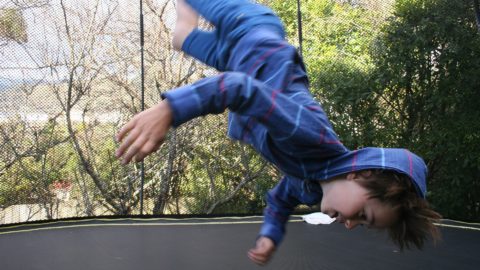Before we dive into the topic of parenting a sensitive child, let’s discuss the problem with “labels.”
No two children are alike. As such, the act of “labeling” children and their behavior can lead adults to incorrect expectations. A common example is the idea that children who exhibit some characteristics and behaviors that fit a particular will automatically exhibit additional characteristics and behaviors that also fit that label. Unfortunately, the result is we anticipate that children will behave in certain ways, which can actually lead adults to unknowingly elicit these behaviors.
The Pillars for Success parenting program strongly believes in the concept “LABEL JARS, NOT PEOPLE.” We believe that the first responsibility of every adult is to learn effective techniques for describing and responding to a challenging behavior. This bust be done in a way that calmly defines the boundaries of that behavior. Additionally, these methods need to teach the child to get his needs met in acceptable ways. Finally, these methods should reward positive behavior choices. All of these steps can potentially lead to reduction/cessation of negative behavior and subsequent solutions for everyone.
However, we acknowledge that for some children, our best efforts are not successful. There can be additional challenges indicated by increased repetition and severity of particular behaviors. This level of complexity may be an indication of issues that involve more serious challenges best addressed with the knowledge and support of a professional in the areas of child development, child behavior, and/or family dynamics.
With the considerations above duly noted, let’s explore the behaviors of children who are considered to be “highly sensitive” and the parenting strategies that will support growth.
Who Qualifies as a “Highly Sensitive” Child?
According to psychologist Elaine Aron, author of The Highly Sensitive Child, the presence of all five characteristics listed below indicate that the child in question faces unique issues that arise from being a “highly sensitive” child:
- Intense emotional reactions
- Deeply processes experiences
- Highly empathetic
- Easily over-stimulated
- Sensitive to subtle stimuli
The most effective ways to parent a sensitive child are woven into the rules and tools of the Pillars for Success parenting program and include:
1. Remain Focused on the “Positive” when Parenting a Sensitive Child
Your job is not to “rebuild” your child but rather to emphasize your child’s strengths. Make sure to support him in developing a positive self-image, and support him in learning coping skills that will help him to overcome the hurdles and challenges he experiences in life. Strengths to focus on may include his creativity, his intellectual ability, his empathy, and his insight.
Do not become your child’s “enemy.” Instead, develop your role as supporter by helping your child recognize triggers at the earliest signs. Additionally, help him to develop the ability to use coping skills when he faces challenges. This will better allow him to continue functioning in a positive way.
2. Value Your Child and His Uniqueness
Deal with the challenges his behavior presents without evaluating his worth. Remember, like every other child, he is a “one-of-a-kind” human being. Also don’t compare him to other children. Value him for who he is, and this will help him develop a sense of his own self-worth.
If he is acting out, being temperamental, or having a tantrum, then follow the rules and tools of the 9 Pillars for Success. Remember to remain calm. In doing so, calmly inform him of the outcomes for his behavior choices in advance, and also inform him of how he will benefit by choosing more positive/cooperative behavior.
Additionally, offer your child “choices.” Remember to focus on solutions in order to help him feel empowered as he learns to choose to follow your directions. (As a result, you will simultaneously retain your parental control.) If he chooses to continue in conflict then calmly inform him of the outcomes in advance. Also let him know that the decision is his, but you will always follow through with the stated outcomes.
3. Separate the Behavior from the Child in Your Mind
Strive to understand the reasons for his positive behaviors and the “triggers” for his negative behaviors. Clearly separate the “behavior” from the “child” both in your own mind AND in how you respond to your child. Remember that undesirable behaviors are not the same thing as an undesirable child. Help your child to recognize his triggers so that he can learn to avoid them at the earliest signs. Also help him to discover how to avoid creating and/or escalating a difficult situation.
Remember that one of the triggers of a highly sensitive child is the environment around him. As such, help your child to create a “safe space” for himself where he can go to calm down. Perhaps this space has soft lighting and a source of soft music… maybe even a cozy blanket and a pillow. Be sure to include your child in designing the “safe space” so that it has features that are acceptable to you and helpful for him.
4. Remember Your Child Can Be Easily Overstimulated
Remember that your child can easily become over-stimulated! In this case, the most supportive parenting involves remaining calm and helping your child to retain self-control. Remember, too, that avoiding situations that can easily lead to over-stimulation and loss of self-control can prevent challenges from becoming out-of-control disasters.
5. Help Your Child Develop a Support System for Himself
This support system should consist of at least one or two friends with whom he can spend time, experience support, and just have fun.
A Few Last Words on Parenting a Sensitive Child
The challenges in parenting any child are dynamic and unique depending on the characteristics of both the child and the parenting adult. However, in the case of a highly sensitive child, parents must be exceptionally sensitive and insightful. Parents must recognize and help their child overcome the additional hurdles resulting from their unique sensitivity.
The challenge is clear. The goal of being a supportive, nurturing, guiding parent is well within the reach of any parent who takes into consideration their child’s unique characteristics and develops the parenting skills to enhance and guide the value of that uniqueness. Additionally, discipline strategies must always be grounded in this approach in order to achieve highly sensitive child parenting strategies that will prove to be successful with a highly sensitive child.
The rules and tools of the Pillars for Success program will help you remain grounded and supportive. This program offers innovative methods of communicating with your child, parenting techniques that encourage positive outcomes, and encouragement to remain focused and patient.
Finally, recognize that while parenting a highly sensitive child is a unique challenge, parenting all of our children while addressing their many unique qualities is also a challenge.













